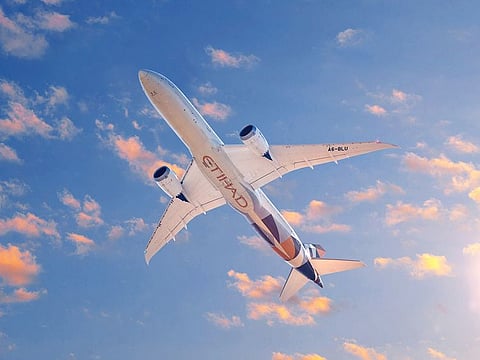5G rollout: UAE, Gulf airlines make different plans for US flights
Etihad and Qatar Airways will retain full schedule, while Emirates briefly halted flights

Dubai: While Emirates briefly halted services to nine US destinations, the Gulf’s other leading carriers – Etihad and Qatar Airways – plan to maintain their schedules, putting into sharp focus the different approaches to the rollout of 5G networks in the US.
Emirates – the world’s largest long-haul carrier – was the first to issue an advisory on Tuesday. “Due to operational concerns associated with the planned deployment of 5G mobile network services in the US at certain airports, Emirates will be suspending flights to the following US destinations from 19 January until further notice.”
The destinations that have seen a halt of Emirates flights are Boston (BOS), Chicago (ORD), Dallas Fort Worth (DFW), Houston (IAH), Miami (MIA), Newark (EWR), Orlando (MCO), San Francisco (SFO) and Seattle (SEA).
On Thursday, however, the airline said it was planning to resume flights to all US cities.
“As a result of telecommunication operators delaying the roll-out of 5G networks around US airports, the US Federal Aviation Administration and Boeing have issued formal notifications that lift the previous restriction on aircraft operations, enabling Emirates to safely restore full scheduled operations to all its US destinations by Saturday,” said Emirates in a new statement.
The issue - which centers around the US 5G networks’ C-band frequency being too close to the that used by radio altimeters on board aircraft - is prompting airlines around the world to either put certain routes on hold or switch to different aircraft types.
While US mobile network operators - AT&T and Verizon - have said they will pause the 5G rollout near airports, multiple airlines are still cancelling flights or switching aircraft over concerns of radio interference caused by the new telecom network. Singapore Airlines, Korean Air, British Airways, and Lufthansa are just some of the carriers adjusting their US operations.
Abu Dhabi’s Etihad Airways will continue to operate its flights as per schedule. Meanwhile, Qatar Airways said flights to all 12 of its US routes will operate normally. “We continue to operate a reliable schedule for our passengers,” said Qatar’s flagship carrier on Twitter.
Bookings to U.S. unaffected
Passengers flying from UAE to US do not seem to be bothered much by the 5G issue. A Dubai-based travel agent said the route has seen “strong” traffic and on the path to complete recovery. “We usually advise our customers to wait for the airlines to cancel so that they can get the full refund,” said the agent.
Quite a challenge
“It’s a challenging affair because a large number of aircraft have radar and radio altimeters, which are crucial for landing, especially in bad weather conditions,” said Fahad Masood, an aviation analyst. “This is a rudimentary system, but the majority of the aircraft are flying well, so they don’t want to change the avionics.”
US telecom majors, who have poured billions of dollars into 5G development over the years, will not back down and a compromise does not seem to be in sight for now. “There has to be a middle way to it,” said Masood. “Maybe, they can reduce the number of towers close to runways. There is a possibility of asking airlines to not approach under bad weather conditions.”
Only applies to the US?
Although several countries have deployed 5G in the past, the aviation sector in US is particularly vulnerable and there’s a reason. Of the 10 busiest global airports, 5 are in US - Hartsfield-Jackson Atlanta International Airport is the busiest airport in the world with roughly 4.4 million seats in January, according to aviation consultancy OAG.
“The issue is the quantum of flying – if there is an occurrence at an airport like JFK or Chicago, there is going to be a ripple effect on the entire airline industry,” said Masood.
Industry insiders also said that US aviation watchdogs like Federal Aviation Administration (FAA) and National Transportation Safety Board (NTSB) are being extra cautious after the 737 MAX debacle. Earlier this month, the issue also caught the attention of former US Airways Pilot Captain Chesley “Sully” Sullenberger. (On January 15, 2009, Sullenberger and his crew safely ditched a commercial airliner in the freezing waters of the Hudson River after an encounter with a flock of geese.)
“Throughout my career, I have clearly understood that in flying, nothing can be left to chance,” said Sullenberger on Twitter. “New 5G frequencies are very close to and can interfere with the frequencies used by critically important cockpit safety devices, especially when we need them the most.”
Cargo too
While most of the industry is fixated on the possibility of a potential crash involving passengers, cargo will also be a big loser in the current scenario. Companies such as Atlas, FedEx and UPS have reportedly warned the US government that they will have to cancel more than 1,000 flights, with some aircraft grounded indefinitely.



